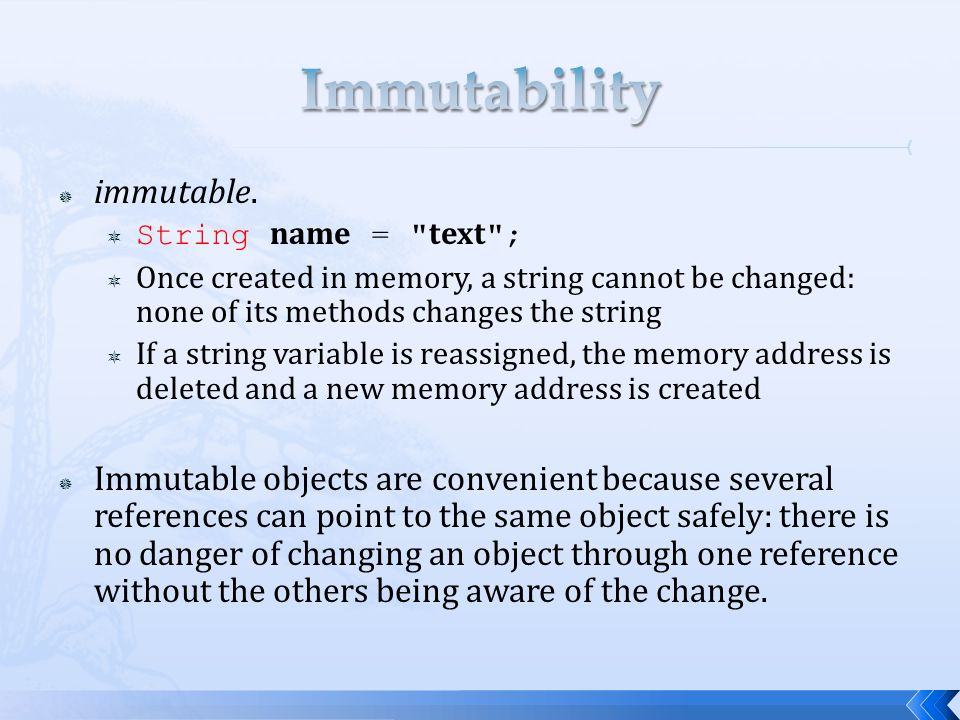What Is Unalterable Strings and How It Functions
In the world of programs, recognizing the concept of immutable strings is critical for developing durable and safe and secure applications. Unalterable strings refer to strings that can not be changed after they are produced, ensuring data integrity and predictability within the code. This basic principle plays a critical function in numerous shows languages and supplies an unique strategy to handling information. By checking out the ins and outs of how unalterable strings work, one can uncover a globe of benefits and opportunities that can raise the high quality and effectiveness of software program advancement.
The Basics of Unalterable Strings
Immutable strings, as a fundamental principle in shows, are character sequences that can not be changed once they are produced. This means that once a string is designated a worth, that value can not be altered. In languages like Python and Java, strings are immutable things, bring about various ramifications in regards to memory management and information stability.
Among the vital advantages of unalterable strings is that they offer a feeling of safety in information manipulation. Given that the web content of an immutable string can not be customized, it makes sure that the initial data stays intact, minimizing the danger of unintentional modifications throughout program execution (Why are strings immutable in Java?). This home additionally simplifies debugging processes, as designers can trust that as soon as a string is specified, its value will not be inadvertently changed
Additionally, unalterable strings assist in reliable memory use. When a brand-new string is created based on an existing one, instead of modifying the initial string, the brand-new worth is saved separately. This approach enhances performance by reducing memory fragmentation and simplifying memory allotment processes. Generally, comprehending the essentials of immutable strings is essential for grasping programming principles and enhancing code effectiveness.
Benefits of Immutable Strings
Building upon the safety and performance advantages of immutable strings, their benefits encompass improving code dependability and simplifying simultaneous programming jobs. By being unalterable, strings can not be customized after creation, which removes the danger of unexpected adjustments in the data they store. This integral immutability makes certain that when a string is produced, its value remains consistent throughout the program's implementation, minimizing the chances of pests caused by unexpected changes.
Additionally, immutable strings add to code integrity by making it much easier to reason regarding the state of a program. Since strings can not be changed, developers can rely on that a string will certainly always hold the same worth, simplifying debugging and maintenance initiatives. This predictability causes more stable and dependable codebases.

Execution in Programs Languages
Within various shows languages, the incorporation of unalterable strings is a basic facet that impacts you could try this out just how information is managed and controlled within code frameworks. The application of immutable strings varies across various programming languages, with each language using its own devices to support this concept.

On the other hand, languages like C and C++ do not have built-in assistance for immutable strings. Developers in these languages have to by hand carry out immutability by enforcing policies within their code to avoid straight adjustments to string objects.
Best Practices for Collaborating With Immutable Strings
When handling unalterable strings in programs languages like Java and Python, sticking to best methods guarantees efficient and safe and secure data manipulation. One of the crucial finest techniques is to use StringBuilder or StringBuffer rather than directly adjusting strings, particularly when taking care of considerable concatenation operations. These courses supply mutable choices for string adjustment, helping to avoid unnecessary memory allocations and boosting efficiency.
Furthermore, when functioning with delicate information such as passwords or API tricks, it is important to stay clear of keeping them as plain message in unalterable strings. Using safe and secure storage space systems like char ranges or specialized collections for dealing with sensitive details helps reduce security her explanation threats linked with unalterable strings.
Real-world Applications and Examples
Discovering practical executions of immutable strings in different sectors discloses their considerable influence on information honesty and system dependability. In the medical care industry, immutable strings play a vital function in making certain the safety and security and discretion of patient information. By useful reference stopping unauthorized alterations to delicate details such as medical documents and prescriptions, immutable strings aid preserve compliance with stringent personal privacy guidelines like HIPAA.
Financial organizations additionally take advantage of the unalterable nature of strings to enhance the security of consumer information and purchase documents. Unalterable strings assist prevent scams and unapproved modifications to financial details, giving a robust defense versus cyber dangers and ensuring the trust and self-confidence of clients.

Conclusion
In final thought, immutable strings are repaired and stable series of characters that offer advantages such as string safety and security and enhanced performance in programs. They are executed in different programming languages to guarantee information integrity and protection. Finest techniques for dealing with unalterable strings consist of avoiding direct modifications and making use of techniques that return new string things. Real-world applications of unalterable strings include information file encryption, caching, and string adjustment tasks.
Immutable strings refer to strings that can not be changed after they are developed, guaranteeing data honesty and predictability within the code. When a new string is produced based on an existing one, instead than modifying the original string, the brand-new value is stored separately.In languages like Java and Python, strings are unalterable by default, implying that as soon as a string item is developed, its worth can not be transformed - Why are strings immutable in Java?. Best practices for working with unalterable strings include staying clear of straight alterations and making use of techniques that return new string objects. Real-world applications of immutable strings consist of information file encryption, caching, and string control jobs
Comments on “Why Are Strings Immutable in Java? Best Practices and Use Cases”